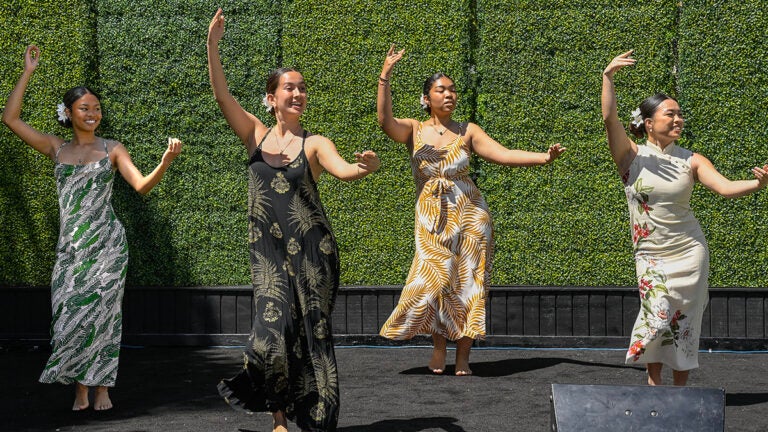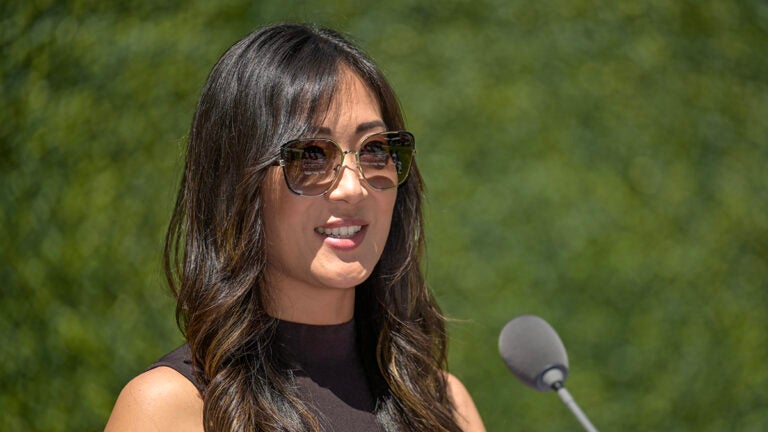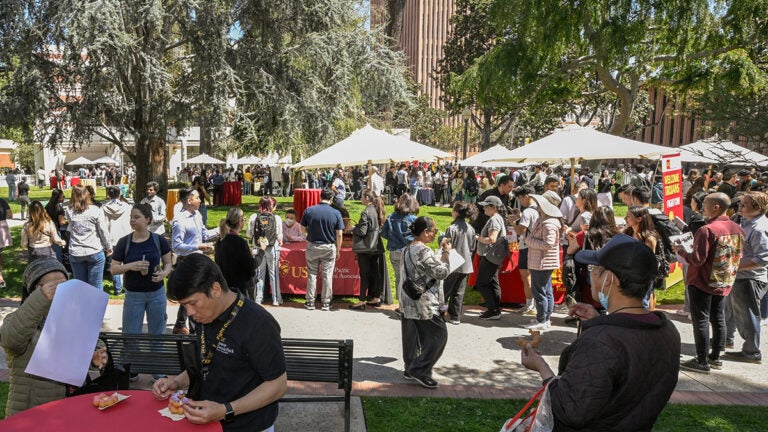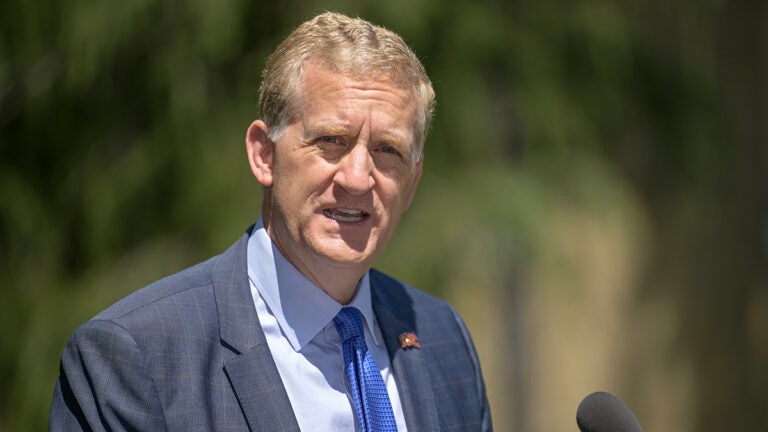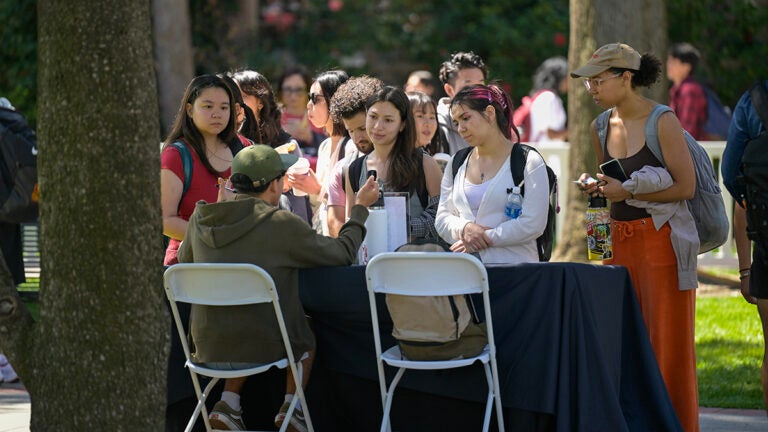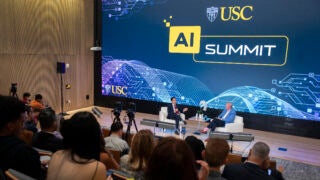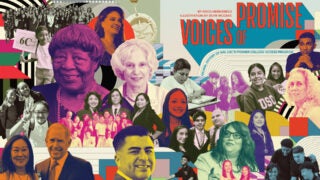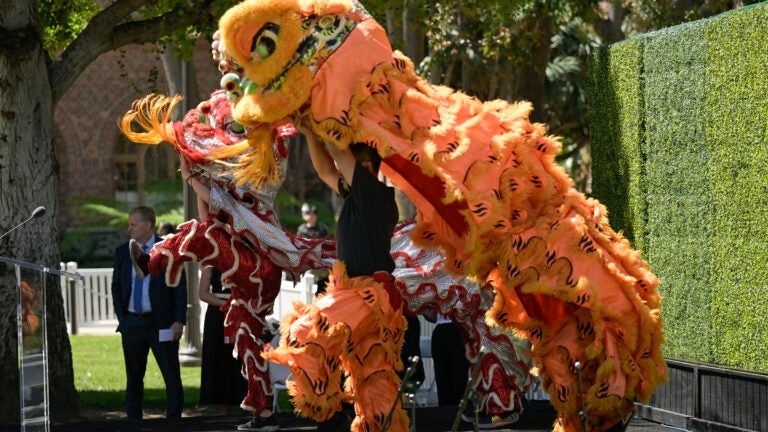
Lion dancers help start the Asian American & Pacific Islander Heritage Month kickoff celebration. (USC Photo/Gus Ruelas)
Asian American & Pacific Islander Heritage Month kickoff celebrates diversity and solidarity
Roughly 1,000 students, faculty and staff enjoyed food, music and dance during the opening event in Founders Park on the University Park Campus.
Film producer and USC School of Cinematic Arts faculty member Nina Yang Bongiovi has spent her career producing films, including Fruitvale Station and Songs My Brother Taught Me, that portray diverse perspectives on American culture.
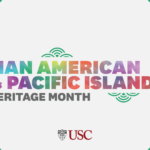
But as a young girl and newcomer to the United States from Taiwan, she felt ashamed of her cultural heritage. Neighborhood kids ridiculed and harassed her when she spoke Mandarin in public.
Yang Bongiovi, who spoke at the university’s Asian American & Pacific Islander Heritage Month kickoff on Tuesday in English and Mandarin, now regards her cultural background with pride.
“As I matured into adulthood, I came to understand that my heritage became my superpower,” said Yang Bongiovi, associate chair of the USC School of Cinematic Arts Peter Stark Producing Program.
Her remarks drew applause from the roughly 1,000 attendees who gathered in Founders Park for the event, where the AAPI community’s rich diversity was on display through food, music, dance and storytelling by USC faculty, alumni and student speakers.
(Story continues below photo gallery.)
Organized by the AAPI Heritage Month Planning Committee, the lunchtime program included performances by Chinese lion dancers from the Northern Shaolin Kung Fu Association, a graceful quartet of hula dancers from the USC Hawaiʻi Club, and USC’s South Asian-fusion a cappella team Asli Baat.
AAPI Heritage Month became federally designated in 1992 to recognize the contributions and influence of Asian Americans and Pacific Islander Americans to the history, culture and achievements of the United States. Observed nationwide in May, the USC celebration takes place instead throughout April, before students disperse for the summer recess. USC Provost Andrew T. Guzman, who spoke at the event, stated that 24% of USC’s undergraduate students and more than 16% of its graduate and professional students identify as AAPI.
“Our history with AAPI students dates back to our very founding,” Guzman said. He noted influential USC AAPI alumni from the past and present, including Margaret Chung, the first Chinese American woman to become a physician; Dominic Choi, the first Asian American chief of the Los Angeles Police Department; and Crazy Rich Asians’ filmmaker Jon M. Chu, who will speak at this year’s commencement ceremony.
Kylie Chen, a senior majoring in creative writing and minoring in French at the USC Dornsife College of Letters, Arts and Sciences, joined the celebration on her lunch break from her job at USC Dornsife’s Office of Overseas Studies.
“I’m grateful USC has events like this,” said Chen, who is Taiwanese American, as she enjoyed Mochinut donuts and milk tea with friends. “It’s good to draw awareness to AAPI culture as well as helping people feel appreciated. Spotlighting people can do a lot for how they feel about their identities. Big events like these bring everyone together and create more of a sense of community.”
USC AAPI Heritage Month kickoff: Joining hands
Event emcee Eryn Cayetano, a member of the USC women’s tennis team, introduced the event’s theme chosen by USC’s Asian Pacific American Student Assembly: “Hand in Hand.”
“The theme underscores the strength that emanates from standing together, supporting one another and recognizing our diversity as a source for resilience,” said Cayetano, whose parents emigrated from the Philippines.
Several of the day’s speakers discussed the unique interplay between diversity and solidarity that characterizes the AAPI community.
“Asians are not a monolith,” said alumna and USC Trustee Jaime Lee, who is Korean American. “We come from over 75 different countries, with 75 different languages and nearly as many ethnicities. We have very little commonality across our varied cultures, traditions, religions, foods, dances and even appearances.”
Yet Lee noted how these disparate groups have banded together to overcome historical and modern prejudice. She described discriminatory California and federal laws in the 19th century that denied Asian immigrants the right to citizenship and prohibited them from owning land or real estate.
“Hand in hand, we have worked together for generations to build coalitions, share resources and create strength in numbers,” said Lee, a real estate executive.
USC alum Mitchell Maki spoke about the forcible exclusion of Japanese American students from many universities, including USC, during World War II as a “dark chapter” in the nation’s and university’s history. He praised USC President Carol Folt’s 2022 conferring of posthumous honorary degrees to 33 Japanese American students who were forced to leave USC in 1942.
“This is just one example that comes from our community of how it has been necessary to stand together to right the wrongs of the past,” said Maki, who runs a nonprofit dedicated to preserving the legacy and lessons of Japanese American World War II veterans.
Punch card as passport
The event allowed attendees to learn about AAPI groups and resources on and off campus. The Asian Pacific American Student Assembly, Asian Pacific Alumni Association and Asian Pacific American Student Services were among the organizations that ran information and activity booths.
At each booth they visited, attendees received one “punch” on event cards marked with six slots.
Those who filled all six slots could use their cards as their free meal ticket for various food and drink offerings. Main dishes included chana masala curry, aloo gobi matar, barbecued chicken musubi and Spam musubi.
Christopher Kim, a Korean American MBA student at the USC Marshall School of Business, enjoyed the Spam musubi.
“What better way to celebrate than to enjoy some food?” Kim said.
Kirk Kim, his classmate at USC Marshall who is also Korean American, appreciated how the activity card provided an opportunity to sample foods from different AAPI cultures.
“It definitely has a good hook to get us involved and exposed to the programs, clubs and organizations out here,” he said.
Ishita Mehta, a graduate student in Thomas Lord Department of Computer Science at the USC Viterbi School of Engineering who hails from India, was happy to see some foods from her native country represented at the multiethnic event. “You definitely feel that you are on a diverse campus in Los Angeles — but you also have that connection to back home,” she said.
USC AAPI Heritage Month events
Tuesday’s kickoff event was one of more than a dozen AAPI Heritage Month events scheduled throughout April and May. Some of these include:
- A screening of the film The Ito Sisters: An American Story (April 5).
- A conversation with muralist Dave Young Kim at the USC Pacific Asia Museum (April 10).
- A talk on the philosophical teachings of the Buddha (April 16).
- A panel discussion on science fiction in East Asia (April 18).
- A lecture by Pulitzer Prize-winning journalist Ed Yong (April 25).

